Angela Naeth on the verge
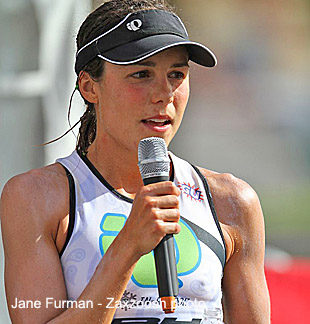
If you are even vaguely familiar with television soap operas, you probably know that actress Susan Lucci was nominated 18 times for an Emmy before she finally won one in 1999 for her role as Erica Kane on
Which is not to say that Naeth does not have the talent and heart of winner, since she won Boulder Peak as a rookie pro in 2008, won the Super Frog half Ironman last year, won the Kenah Olympic distance event in April and finished 2nd overall and 1st woman at the epic Leadman 250 last week. Along the way, she has earned a reputation as one of the greatest cyclists in the sport, setting fastest bike split 8 times in 14 races last year and set a women’s bike course record at St. Croix this year while finishing ahead of Mirinda Carfrae and just 2:39 back of winner Catriona Morrison at the finish.
Through it all, Naeth is a staunch individualist who grew up in Prince George Canada next to the Yukon wilderness and is coached by a supreme individualist, Chuckie Veylupek. Along the way, she spent a year with famed coach Brett Sutton which ended with stress fractures and she now works with Mark Allen’s key adviser Dr. Phil Maffetone — who works in tandem with Chuckie V.
At the moment, the bike is her ace in the hole, she has improved her run to post several second-best splits in major races, and still finds the swim to be a mystery that must be solved.
Slowtwitch: What was the dumbest thing you have ever done in training or racing?
Angela Naeth: Honestly, the dumbest thing I’ve done was feeling obligated to listen to Brett Sutton when he told me to “train through the pain.” I knew things weren’t right and I should not have caved in to the pressure. There’s good pain and there’s bad pain. And that was definitely the bad kind. I have a fair amount of respect for Brett, but I feel like he is under some sort of time-related pressure to produce the next Chrissie.
ST: What did you learn from it?
Angela: To trust my own experience and intuition, and to continue to be aware of the signs my body sends me. It knows better than any coach, and even better than I do!
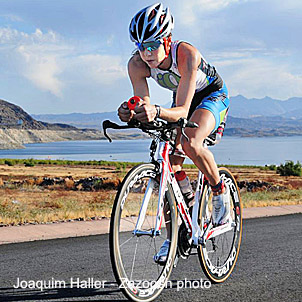
ST: Interesting article in the New York Times today by Health/Science writer Gina Kolata in which physicians spoke of a difference between clinical pain and exhaustion/ fatigue. Kolata asked Peter Sagal, the host of an NPR show and a columnist for Runner’s World, what is relationship between runners and pain and he said: “What is it about the pain of endurance sports that’s fun? … I say because the pain is sort of the point? My thesis is that the pain isn’t an obstacle to achievement so much as part of the achievement. We actually want to suffer.”
What is your relationship with pain?
Angela: I’m of the mindset that if you choose it, it’s not really pain. In sport, pain and suffering are choices, and anyone who complains about their choices needs to change their choices. Yes, training hurts, but it beats not training.
ST: Can you describe pushing through that point of pain?
Angela: In some of our training bouts we’ll throw in hard surges beyond what is already an intensely painful level, because so much of what pain is, is a perception. You can always hurt more, even if only briefly. While racing, I keep this in the back of my mind and try to push through the pain that I have chosen. As my coach says, “It’s only your inability to accept the hurt that hurts you!” Mind you, one has to know just how much he or she can push and still reach the finish line his or her fastest. This is something I’m still learning, as there have been a few races where I’ve overcome the hurt, only to slow way down before the finish, which of course hurts even more!
ST: Kolata’s article notes there are certain mechanisms in the body which provide a reserve when the body can override the fatigue signals to slow down. Scientifically speaking, Dr. Peter Amann told Kolata, “What actually stops or slows most people during exercise is fatigue, not pain.” Can you train your body to overcome the signals to stop?
Angela: This is essentially Tim Noakes’ theory, regarding the “central governor” and the conscious and subconscious processes. I don’t know about overcoming the signals, as there would be no way to do so entirely. It’s perhaps a case of coping with such signals a little better. After all, we’re the ones in control of the signals, both in terms of transmission and reception! A great read on this is Matt Fitzgerald’s “Run: The Mind/Body Method of Running by Feel” book and it helped switch on many lights in my head. The issue my coach sees with it all, however, is that it might persuade us to push too often or too soon, when we haven’t quite reached a state of readiness. Fatigue is a learned skill, he says, and we have to be slow learners, or we break.
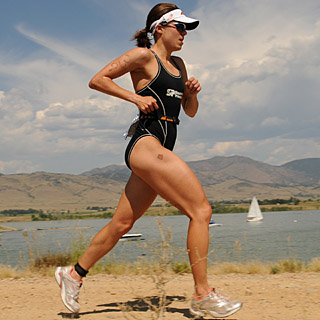
ST: Are insensitive brutes who do not feel the pain better endurance athletes?
Angela: If they’re desensitized they might be, but insensitive, no. Some athletes don’t get injured and can train through anything it seems. This may make them able to endure better, but it doesn’t always make them faster athletes. A faster athlete is a better athlete!
ST: Are the best triathletes masochists? Sadists to their own body’s normal aversion to pain? Or what?
Angela: To a degree, but they’re more likely just obsessive-compulsive types like me! They like small dosages of pain spread out over a long time, and they want complete control over the dosage.
ST: Did you near your breaking point at any time during Leadman 250?
Angela: Yes. Numerous times. I cried and I cussed a lot more than I care to re-enact. Of course, it was entirely psychological, but I came to a point on the bike (around mile 110) where I seriously questioned my love of this stuff. The wind was the worst of it, because there’s nothing tangible about it…no end in sight like there is with a hilltop. At times I was descending at a whopping 4 mph. The first two miles of the run were also absolute hell and things only got harder from there! But these long races are just a process of elimination, not so much in terms of eliminating competition, but in eliminating real estate as it passes by. Each mile is one less you have to do, as you make your way to the finish line!
ST: Take any satisfaction in 2nd overall and chicking 42 men?
Angela: Not really. My race is within.
ST: What did you like about Leadman 250 – besides reaching the finish line?
Angela: That it was something I had never experienced before. I love new experiences, or I thought I did! Initially, I approached my coach with the idea of doing this event under the pretext that it was a good stepping-stone toward doing an Ironman someday, which is certainly in the crosshairs. And that’s how I sold him on it, as we base everything on a step-by-step progression. In many ways, though, the Leadman 250 was harder than an Ironman. Of course, I don’t really know since I haven’t done one, but I think it gave me an idea of what to expect. But here now a few days later, my recovery is almost complete, and I know that wouldn’t be the case after running 26.2 miles.
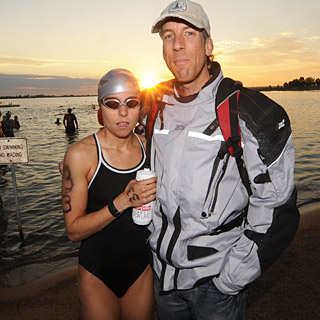
ST: OK. After eight second place finishes on the Ironman 70.3 circuit, you have achieved a notable reputation for consistent excellence. But you might also be described as triathlon’s Susan Lucci if you don’t win one soon. So when will your 70.3 runner-up streak end?
Angela: I know who Susan Lucci is, only because Chuckie’s in love with her. But to answer your question, I don’t know when my runner-up streak will end. Hopefully at my next race! Ultimately, I race to do my best, regardless of placing. But I know my best is better than second place every darn time! Still, there have been times I’ve been second to the sports best and, on occasion, have even beaten the sport’s best (only to finish second anyway!) [e.g. beat Mirinda Carfrae at St Croix but lost to Catriona Morrison] No doubt it is frustrating, but I don’t want to shy away from competition and cherry-pick the races I enter. I’m sure by now I could have entered and won a lesser competitive 70.3, but why? I’m not afraid to lose. I don’t think a champion can be made if she’s afraid.
ST: What was your best performance in your estimation – in contrast to the result, which may have been numerically lackluster?
Angela: It really hasn’t happened yet, but it’s coming I’m sure. I guess it would have to be Vineman 70.3 last year, when I raced my heart out but finished a disappointing 5th. But I was tired going in, having made a number of mistakes all week; I thought I could squeeze in some “extra credit” training without my coach’s knowledge. So even though it was my best effort, it wasn’t my best performance.
ST: What was your worst performance in your estimation — in contrast to on-the-surface impressive finishing position or time?
Angela: I haven’t really had a result like that yet, probably because I generally stray away from races where top results are basically guaranteed or handed to you. I love competition! Right now though there are still quite a few women’s races with very shallow fields, but I think it’s steadily changing, since with prize money comes competition.
ST: What is it about your physical and mental gifts that make you such a great cyclist? I see 11 fastest bike split or bike course records on your CV.
Angela: My truest strength probably lies in bike racing. My coach says I have the highest power-to-weight ratio of any female he’s seen or ever ridden with. [5-5, 115 pounds] So I have to thank my parents for (and their parents too!) for the physical attributes. As for the mental attributes, I think it’s always a little easier to embrace some more pain when you’re good at something.
ST: How have you trained to reach that level of cycling performance?
Angela: Trained? I don’t train! I coast down to the coffee shop and read the latest cycling magazine. In all honesty, I’d love to share that information with your readers but my coach would kill me. His background is as a cyclist and he knows precisely how the biggest names in the sport train, and he still has contact with quite a few of them. So we use many of the same tactics. But, for the most part, it’s just time in the saddle. It seems every day is another long day!
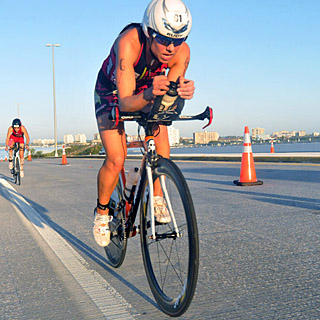
ST: What has been the best coaching direction/ advice/training that has improved your cycling?
Angela: Listening to Chuckie. Again, cycling is his prime area of expertise and the way he structures things is not how I’d have ever done it, or even how Sutton does it. But it’s so much more sensible and we see that it works. I no longer worry and instead just take orders!
ST: How far have you progressed in becoming a better runner, one who can take your cycling prowess and bank a few wins on the run? How far do you have to go on that front?
Angela: The issue with running is that I have to develop slowly to get where I’d like to be. Otherwise I run into problems, literally and figuratively. We’re inching our way forward year by year, so that I can handle the load necessary to run with, or possibly outrun, others. I actually come from a running background [University of Missouri] but never developed a solid base because of injuries incurred from running too hard too often. Most college coaches here in the US are crap and mine were no different. What’s interesting is that my races are my hardest run workouts. Every other run leaves me feeling like I can do more, which is how it’s supposed to be, I guess.
ST: Ever tempted to switch from triathlon to cycling like Olympic cycling gold medalist Kristen Armstrong? Do you admire/identify with cycling world champion and multiple Ironman winner Karin Thürig of Switzerland? What about Olympic silver medalist/cyclist Mari Holden, who started out as a triathlete?
Angela: I have played with the idea, but cycling is a very male-centric sport and I’m afraid the money just isn’t there to assure a female’s survival. When I first started triathlon I actually jumped into a few cycling races but ended up breaking my hip in a fall during my second race. The risks are high and the rewards are low. At Galveston 70.3, when I went directly head-to-head with Karin [Thürig], I saw what a world-class cyclist could do. I was thoroughly impressed with her ability to ride (and run!). [Naeth actually came off the bike close to Thurig, who is an even worse swimmer, then Naeth outran her by 1:28 and beat her for 2nd by 50 seconds]. Both coach and I think I’m ultimately suited for cycling, but that it’s such a long learning curve. Likewise, the typical time trial layout is geared more toward the heavier girls. At 115 pounds, I need hills if I’m to inflict pain!
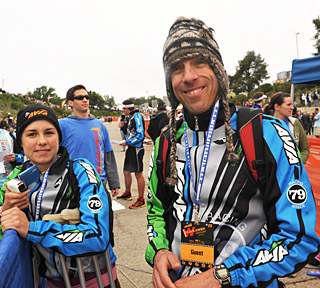
ST: You have had a very interesting set of coaches/advisers whose reputations are very different. And, to people who do not know them well, they seem to be polar opposites. Can you offer a summary of what is most misunderstood about Chuckie V, Brett Sutton, and Phil Maffetone?
Angela: First of all, there are more commonalities amongst them than there are differences. They are all seekers of success and they all prefer to work in a hand’s-on manner. Phil and Chuckie see eye-to-eye on most methodology, but they have their differences, subtle though they are. Brett is really only about the end result, where Phil and Chuckie are about the process toward that result. They all want the same thing (that end result) but have each learned their own way to go about it.
I would like to say that Phil is one of the most misinterpreted people in our sport, yet clearly one of the more accomplished advisors. Every single name he’s been associated with is one that every triathlete should recognize, including a few different Ironman World Champions. That involvement was enough for Chuckie and I to seek his counsel, and as it turns out he lives just up the road from us in Arizona.
Brett is more a case of, “what you see is what you get.” He’s rough and it’s definitely “his way or the highway,” but his results obviously speak for themselves. I hope one day he writes a book (with someone’s help, of course!).
Angela: Chuckie really can’t be compared to anybody. He’s an absolute freak of nature in so many ways and he’s talented in everything he attempts, whether it’s music or writing or athletics — you name it. Heck, we just got back from Vegas where he was escorted out of a casino for counting cards! All said, I’m just glad he doesn’t coach any other pro women. You guys should interview him!
ST: Would Chuckie still be your coach if he maintained that spiky 1990s mohawk every day?
Angela: Most definitely. But he would not be my boyfriend.
ST: Can you outline the best things each of them have done for you as an athlete and as a person?
Angela: Chuckie showed belief in me long before I ever had it in myself. Brett showed me the work ethic necessary, though he tends to think everything outside of training is inconsequential. Phil continues to show me what both the wholistic and holistic approaches mean and that everything affects everything! I continue to learn from each of them, but primarily from Phil. I work with both Chuckie and Phil on a daily basis.
ST: Talk about your injury that cost you most of the 2009 season. In your blog you wrote: “Unfortunately I kicked my own arse a bit too hard and ended up fracturing my leg near the knee. I kept running on it and almost broke the tibia fully. I was literally walking on a fine line. Back in the US, the doctor wanted to put me in a full leg cast. Instead, I opted for crutches and was diligent on not putting any weight on the leg. I managed OK but it was the hardest 4 months I've ever gone through. In the past I'd broken my hip in a bike crash but at the time I was in school and was too busy to do anything else. With this fracture, I twiddled my thumbs and let my mind get the best of me at times. It was a long 4 months of no riding or running, and swimming very cautiously.” What caused it? What did you learn from it?
Angela: Ultimately, I caused it. But there was a lot of pressure from Brett to train through the pain. I should have known better as I’ve incurred similar injuries in the past, and they’ve always set me back. It was a stress-fracture that became a complete fracture because of my inability to say no to Brett. Of course, he doesn’t allow you to. Or he didn’t with me, anyway. The doctors wanted to put me in a wheelchair for six months but I was able to talk my way into using crutches instead. I learned that no one knows my body like I do. I continue to develop that knowledge better and better but I’ll never let anyone dictate its terms.
ST: Were you worried that your career might be over? What are you doing to make sure it won’t reoccur?
Angela: At the time my career was over. I didn’t have the desire to make a comeback and doubted my abilities. Chuckie reminded me it’s a fun sport even outside of competition and so I just started over again for the same reasons I started in the first place – I loved the lifestyle. Of course, that didn’t last long and my competitive fire was soon re-ignited.
ST: You were on the edge economically. Ever tempted to quit and get a job?
Angela: Unfortunately that year, because I didn’t compete, I fell into debt and had to go back to Canada to work as a physio over the winter. But it allowed me the chance to take another stab at it in 2010, when everything started coming together. Besides listening to my body and making constant readjustments when needed, I seek the advice from the people like Phil, who seem to know how to strike the perfect balance between health and fitness in those he works with. I’ll never compromise my health again.
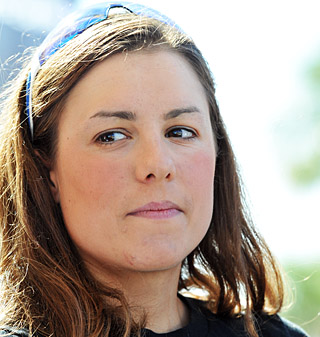
ST: What did you learn about Ironman Hawaii by watching it last year that will help you when you race it?
Angela: I don’t think I’ll be truly racing it my first time out but rather simply trying to finish. It’s certainly a runner’s course and so it may be an additional year or two before I’m ready for it. So for now I’m building my run volume — or “training to train.” Some processes cannot be rushed and running is close to the top of that list. Like Chris Lieto probably does, I’ll pray for some horrific winds on the bike!
ST: I see from your website you want to be a doctor and love watching operations. What level of operation on yourself would you insist on watching live? Scope of your medial collateral ligament? Appendix removal? Liver transplant? Heart surgery? Brain surgery?
Angela: A brain transplant might be fun to watch though I’m not sure how that would work. Blood and tissue has never frightened me. The human body intrigues me and I love to help others when help is needed. My job as a physio enables me to do this to a lesser degree, but for some reason I can’t get medical school out of my head.
ST: If this is not a fantasy, when might you enter med school? What type of doctor would you prefer to become?
Angela: Of course things always change in life, but I’d love go back to school after my triathlon career (which I foresee lasting another 10+ years). I’m interested in being an emergency room physician.
ST: Q What real life doctor inspired you to think about this line of work?
Angela: As silly as it may sound, watching the TV show ER actually inspired me the most! When I was a kid, I’d watch every episode and dreamt of being the doctor who saved those patients on their deathbed. Turns out ER is a bit Hollywoodized! Can you imagine that?!
ST: I see you are a Canadian who grew up somewhere near Jack London, Yukon wilderness, dog sled/gold mine/ bush pilot sort of territory. Does that have anything to do with your courage in sport and embrace of crazy races like Leadman 250?
Angela: Of course. We Canadians are tough. But that goes without saying. The Leadman 250 lasted ten and a half hours. A Prince George winter lasts 10 and a half months.
ST: For some strange reason, I have never met a Canadian I didn’t like. Why is this? Are there any mean, unsavory, unlikeable Canadians?
Angela: I know one or two (and they’re not just hockey players), but it’s only because they’re here in the US! No, I kid: they were unlikeable before they left. But that’s a pretty good ratio, eh? One or two out of thirty million! I think most Canadians are too busy drinking Molson and maple syrup to worry about being mean.
ST: You describe your happiest moment as the time when you found out that your parents’ cancer was curable. Please elaborate.
Angela: I was even happier when each of them was cured! Cancer is a tough one. Part of me believes it’s a man-made disease and that we could do so much more to overcome it, but then you have to wonder what that might do to the medical or pharmaceutical industry. But my parents are healthy and happy and that makes me happy.
ST: What song ever stuck in your head during a race?
Angela: None, really. I think my mind just sort of goes blank, which is unusual for me.
ST: What book has intrigued you?
Angela: Viktor Frankl’s 1946 book, “Man’s Search for Meaning.” It still does.
ST: What irks you?
Angela: Fake types, and women’s pro triathlon, I hate to say, is full of them. It’s one reason I train with men.


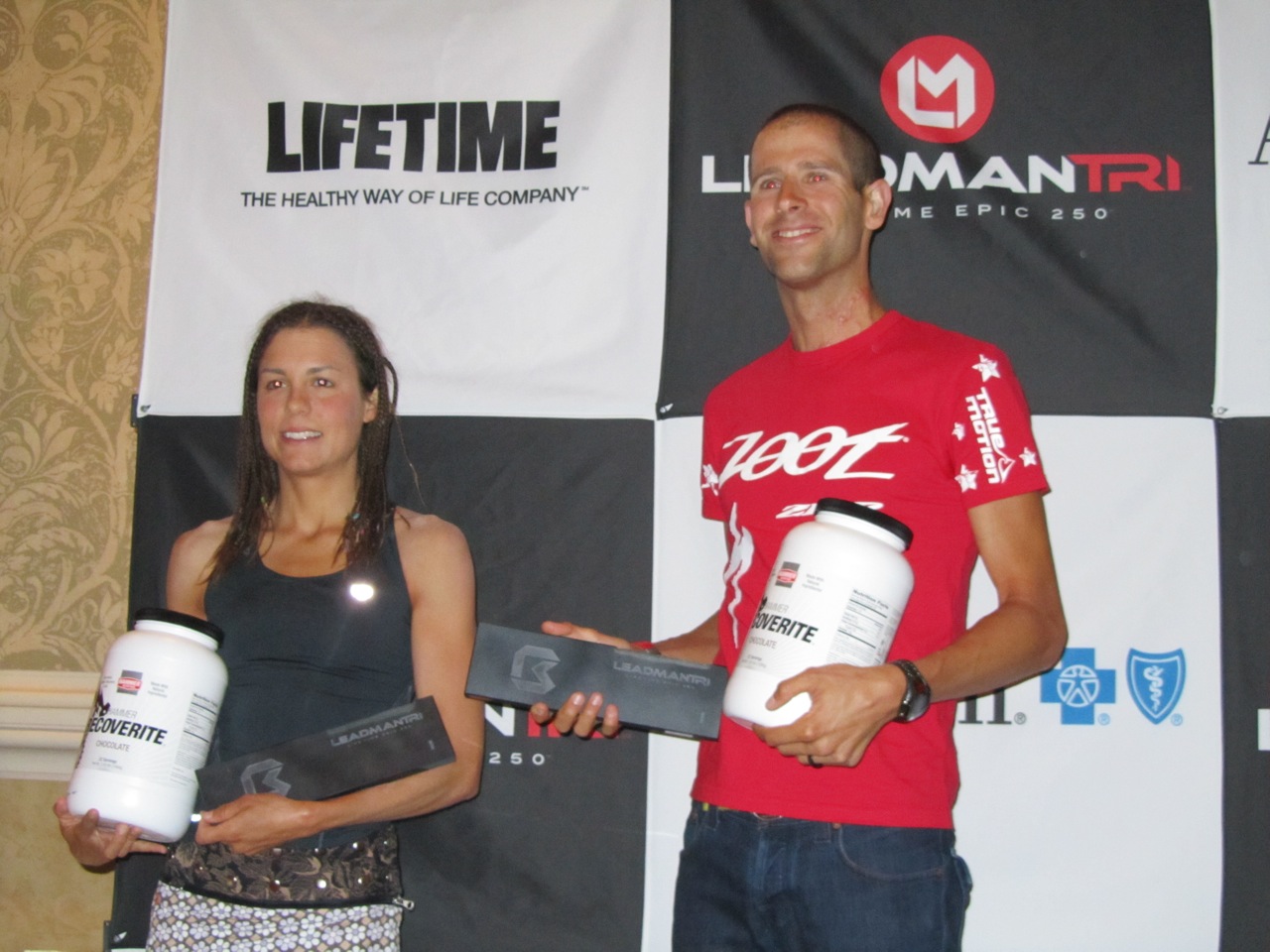
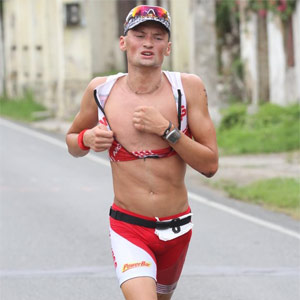
Start the discussion at slowtwitch.northend.network